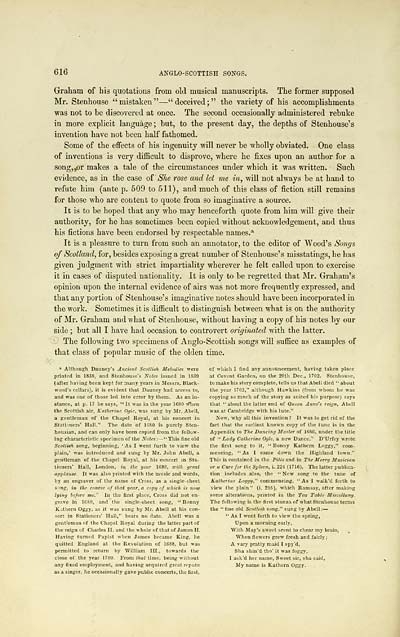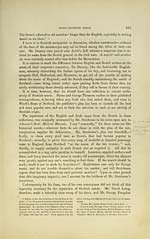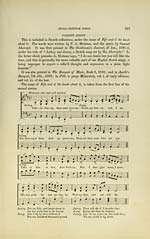Glen Collection of printed music > Printed text > Popular music of the olden time > Volume 2
(240) Page 616
Download files
Complete book:
Individual page:
Thumbnail gallery: Grid view | List view

616 ANGLO-SCOTTISH SONGS.
Graham of his quotations from old musical manuscripts. The former supposed
Mr. Stenhouse "mistaken" — "deceived;" the variety of his accomplishments
was not to be discovered at once. The second occasionally administered rebuke
in more explicit language; but, to the present day, the depths of Stenhouse's
invention have not been half fathomed.
Some of the effects of his ingenuity will never be wholly obviated. One class
of inventions is very difficult to disprove, where he fixes upon an author for a
song^pr makes a tale of the circumstances under which it was written. Such
evidence, as in the case of She rose and let me in, will not always be at hand to
refute him (ante p. 509 to 511), and much of this class of fiction still remains
for those who are content to quote from so imaginative a source.
It is to be hoped that any who may henceforth quote from him will give their
authority, for he has sometimes been copied without acknowledgement, and thus
his fictions have been endorsed by respectable names. a
It is a pleasure to turn from such an annotator, to the editor of Wood's Songs
of Scotland, for, besides exposing a great number of Stenhouse's misstatings, he has
given judgment with strict impartiality wherever he felt called upon to exercise
it in cases of disputed nationality. It is only to be regretted that Mr. Graham's
opinion upon the internal evidence of airs was not more frequently expressed, and
that any portion of Stenhouse's imaginative notes should have been incorporated in
the work. Sometimes it is difficult to distinguish between what is on the authority
of Mr. Graham and what of Stenhouse, without having a copy of his notes by our
side ; but all I have had occasion to controvert originated with the latter.
The following two specimens of Anglo-Scottish songs will suffice as examples of
that class of popular music of the olden time.
■ Although Dauney's Ancient Scottish Melodies were of which I find any announcement, having taken place
printed in 1838, and Stenhouse's Notes issued in 1S39 at Covent Garden, on the 29th Dec, 1702. Stenhouse,
(after having been kept for many years in Messrs. Black- to make his story complete, tells us that Abell died " about
wood's cellars), it is evident that Dauney had access to, the year 1702," although Hawkins (from whom he was
and was one of those led into error by them. As an in- copying so mnch of the story as suited his purpose) says
stance, at p. 17 he says, " It was in the year 1680 vfhen that " about the latter end of Queen Anne's reign, Abell
the Scottish air, Katherine Ogie, was sung by Mr. Abell, was at Cambridge with his lute."
a gentleman of the Chapel Royal, at his concert in Now, why all this invention? It was to get rid of the
Stationers' Hall." The date of 1G80 is purely Sten- fact that the earliest known copy of the tune is in the
housian, and can only have been copied from the follow- Appendix to The Dancing Master of 16SC, under the title
ing characteristic specimen of the Notes: — "This fine old of " Lady Catherine Ogle, a new Dance." D'Urfey wrote
Scottish song, beginning, 'As I went furth to view the the first song to it, "Bonny Katbern Loggy," com-
plain,' was introduced and sung by Mr. John Abell, a mencing, "As I came down the Highland town."
gentleman of the Chapel Royal, at his concert in Sta- This is contained in the Pills and in The Merry Musician
turners' Hall, London, in the year 1680, with great or a Cure for the Spleen, i. 224 (1716). The latter publica-
applause. It was also printed with the music and words, tion includes also, the " New song to the tune of
by an engraver of the name of Cross, as a single-sheet Katherine Loggy," commencing, "As I walk'd forth to
song, in the course of that year, a copy of which is now view the plain" (i. 295), which Ramsay, after making
lying before me." In the first place, Cross did not en- some alterations, printed in the Tea Table Miscellany.
grave in 1680, and the single-sheet song, "Bonny The following is the first stanza of what Stenhouse terms
K;ithern Oggy, as it was sung by Mr. Abell at his con- the "fine old Scottish song," sung by Abell: —
sort in Stationers' Hall," bears no date. Abell was a " As I went forth to view the spring,
gentleman of the Chapel Royal during the latter part of Upon a morning early,
the reign of Charles II. and the whole of that of James II. With May's sweet scent to chear my brain,
Having turned Papist when James became King, he When flowers grew fresh and fairly;
quitted England at the Revolution of 1688, but was A vary pratty maid I spy'd,
permitted to return by William III., towards the Sha shin'd tho' it was foggy,
close of the year 1700. From that time, being without I ask'd her name, Sweet sir, sha said,
any fixed employment, and having acquired great repute My name is Kathern Oggy.
as a singer, he occasionally gave public concerts, the first,
Graham of his quotations from old musical manuscripts. The former supposed
Mr. Stenhouse "mistaken" — "deceived;" the variety of his accomplishments
was not to be discovered at once. The second occasionally administered rebuke
in more explicit language; but, to the present day, the depths of Stenhouse's
invention have not been half fathomed.
Some of the effects of his ingenuity will never be wholly obviated. One class
of inventions is very difficult to disprove, where he fixes upon an author for a
song^pr makes a tale of the circumstances under which it was written. Such
evidence, as in the case of She rose and let me in, will not always be at hand to
refute him (ante p. 509 to 511), and much of this class of fiction still remains
for those who are content to quote from so imaginative a source.
It is to be hoped that any who may henceforth quote from him will give their
authority, for he has sometimes been copied without acknowledgement, and thus
his fictions have been endorsed by respectable names. a
It is a pleasure to turn from such an annotator, to the editor of Wood's Songs
of Scotland, for, besides exposing a great number of Stenhouse's misstatings, he has
given judgment with strict impartiality wherever he felt called upon to exercise
it in cases of disputed nationality. It is only to be regretted that Mr. Graham's
opinion upon the internal evidence of airs was not more frequently expressed, and
that any portion of Stenhouse's imaginative notes should have been incorporated in
the work. Sometimes it is difficult to distinguish between what is on the authority
of Mr. Graham and what of Stenhouse, without having a copy of his notes by our
side ; but all I have had occasion to controvert originated with the latter.
The following two specimens of Anglo-Scottish songs will suffice as examples of
that class of popular music of the olden time.
■ Although Dauney's Ancient Scottish Melodies were of which I find any announcement, having taken place
printed in 1838, and Stenhouse's Notes issued in 1S39 at Covent Garden, on the 29th Dec, 1702. Stenhouse,
(after having been kept for many years in Messrs. Black- to make his story complete, tells us that Abell died " about
wood's cellars), it is evident that Dauney had access to, the year 1702," although Hawkins (from whom he was
and was one of those led into error by them. As an in- copying so mnch of the story as suited his purpose) says
stance, at p. 17 he says, " It was in the year 1680 vfhen that " about the latter end of Queen Anne's reign, Abell
the Scottish air, Katherine Ogie, was sung by Mr. Abell, was at Cambridge with his lute."
a gentleman of the Chapel Royal, at his concert in Now, why all this invention? It was to get rid of the
Stationers' Hall." The date of 1G80 is purely Sten- fact that the earliest known copy of the tune is in the
housian, and can only have been copied from the follow- Appendix to The Dancing Master of 16SC, under the title
ing characteristic specimen of the Notes: — "This fine old of " Lady Catherine Ogle, a new Dance." D'Urfey wrote
Scottish song, beginning, 'As I went furth to view the the first song to it, "Bonny Katbern Loggy," com-
plain,' was introduced and sung by Mr. John Abell, a mencing, "As I came down the Highland town."
gentleman of the Chapel Royal, at his concert in Sta- This is contained in the Pills and in The Merry Musician
turners' Hall, London, in the year 1680, with great or a Cure for the Spleen, i. 224 (1716). The latter publica-
applause. It was also printed with the music and words, tion includes also, the " New song to the tune of
by an engraver of the name of Cross, as a single-sheet Katherine Loggy," commencing, "As I walk'd forth to
song, in the course of that year, a copy of which is now view the plain" (i. 295), which Ramsay, after making
lying before me." In the first place, Cross did not en- some alterations, printed in the Tea Table Miscellany.
grave in 1680, and the single-sheet song, "Bonny The following is the first stanza of what Stenhouse terms
K;ithern Oggy, as it was sung by Mr. Abell at his con- the "fine old Scottish song," sung by Abell: —
sort in Stationers' Hall," bears no date. Abell was a " As I went forth to view the spring,
gentleman of the Chapel Royal during the latter part of Upon a morning early,
the reign of Charles II. and the whole of that of James II. With May's sweet scent to chear my brain,
Having turned Papist when James became King, he When flowers grew fresh and fairly;
quitted England at the Revolution of 1688, but was A vary pratty maid I spy'd,
permitted to return by William III., towards the Sha shin'd tho' it was foggy,
close of the year 1700. From that time, being without I ask'd her name, Sweet sir, sha said,
any fixed employment, and having acquired great repute My name is Kathern Oggy.
as a singer, he occasionally gave public concerts, the first,
Set display mode to: Large image | Transcription
Images and transcriptions on this page, including medium image downloads, may be used under the Creative Commons Attribution 4.0 International Licence unless otherwise stated. ![]()
| Special collections of printed music > Glen Collection of printed music > Printed text > Popular music of the olden time > Volume 2 > (240) Page 616 |
|---|
| Permanent URL | https://digital.nls.uk/91364874 |
|---|
| Shelfmark | Glen.254a |
|---|---|
| Additional NLS resources: | |
| Attribution and copyright: |
|
| Description | Scottish songs and music of the 18th and early 19th centuries, including music for the Highland bagpipe. These are selected items from the collection of John Glen (1833 to 1904). Also includes a few manuscripts, some treatises, and other books on the subject. |
|---|
| Description | The Glen Collection and the Inglis Collection represent mainly 18th and 19th century Scottish music, including Scottish songs. The collections of Berlioz and Verdi collected by bibliographer Cecil Hopkinson contain contemporary and later editions of the works of the two composers Berlioz and Verdi. |
|---|

